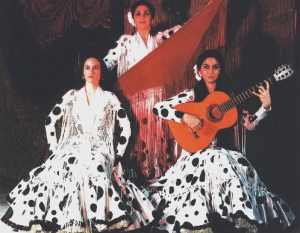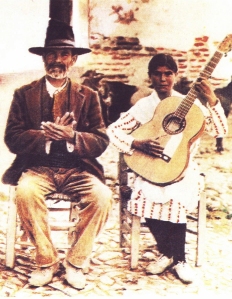Loren Chuse is an ethnomusicologist whose work focuses
on  music of Spain and Latin America, with an additional interest in music of the Arabic-speaking world. Loren received her Ph.D in ethnomusicology from the University of California, Los Angeles in 1999. She has a background in Music History and did her Master’s Degree in Music History at San Francisco State University.
music of Spain and Latin America, with an additional interest in music of the Arabic-speaking world. Loren received her Ph.D in ethnomusicology from the University of California, Los Angeles in 1999. She has a background in Music History and did her Master’s Degree in Music History at San Francisco State University.
Loren has conducted extensive research in Spain on flamenco performance. She is particularly interested in the role of women in Spanish flamenco, both their historical and their contemporary participation. She has investigated the important role of women singers (cantaoras) in the flamenco tradition, as well as the emerging group of women flamenco guitarists, (tocaoras) in Spain.
As an ethnomusicologist Loren is interested in the essential role of music in social construction; the ways in which music so powerfully articulates a sense of identity, often multi-faceted and complex. Her interests also include the role of music in the articulations of nationalism. Her research on the role of women singers and female guitarists in the Spanish Flamenco tradition emphasize issues of identity, ethnicity, class, and gender, with a focus both on traditional forms as well as on recent popular fusion genres.
Loren’s work is interdisciplinary, drawing on theoretical orientations in ethnomusicology; historical musicology; anthropology; gender and cultural studies. Her doctoral dissertation. The Cantaoras: Music, Gender and Identity in Flamenco Song, was published by Routledge Press as Volume Seven of its series, “Outstanding Dissertations in Ethnomusicology” in 2003. Her book was later translated into Spanish, published under the title, Mujer Y Flamenco, by Ediciones Signatura in 2007. Loren’s research interests include hybrid, popular genres of flamenco fusion, fusions with salsa, jazz, and other popular music, as well as fusions with “world music”. She continues this interest with recent research that focuses on collaborations between North African and Arabic music and flamenco. She has conducted fieldwork in Spain and Tetuán, Morocco and has presented at scholarly meetings on the topic of these collaborations.
Previously Loren’s research on Andean music resulted in her M.A thesis Andean Ritual Flute Ensembles in Southern Peru and Bolivia, which investigates the social and cultural meanings of traditional wind ensemble music as it is enacted in ritual performance in the Andes. She is a performer of Andean musical genres and has worked with Latin American ensembles on flute, zampoña, charango, guitar and voice. Loren is a long-time performer of classical music, as singer and flutist.
More recently she has pursued Arabic musical interests and has played Arabic ‘oud in several Middle Eastern ensembles.
Selected Conference Papers
2017 Tan Cerca/Tan Lejos: Musical Collaborations between Flamenco and North African Musicians. Presentation at “Music, Nation, and Region in the Iberian Peninsula: (Re)Sounding: History, Identity, and Heritage”. University of Cambridge. UK June 2017
2017 “The Development of the Malagueña: From Café Cantante to the Present”. Foundation for
Iberian Music, Barry S. Brook Center, NYC; Spaniards, Natives Africans, and Gypsies:
Transatlantic Malagueñas and Zapateados in Music Song and Dance, UC, Riverside April 2017
2016. Challenging Gender Exclusion: Women and the Flamenco Guitar. 9th Symposium of the ICTM Study Group on Music and Gender Gender, Performance, Activism: Transcultural Conversation. International Council for Traditional Music. Bern, Switzerland. July 13-16, 2016
2016. Tan Cerca/Tan Lejos: Musical Collaboration between Spanish Flamencos and North
African Musicians. Presentation at “Musicians in the Mediterranean: Narratives of Movement”. Mediterranean Studies Meeting of the International Council for Traditional Music. Naples, June
2016. La Tocaoras: Women Guitarists and their Struggle for Inclusion on the Flamenco Stage. Presentation at “Flamenco and the Articulation of Identity”. University of California, Riverside,
2015 Fandangos in Voices of Women: Enacting Tradition, Affirming Identity Presentation at the International Conference: “Spaniards, Indians, Africans, and Gypsies. The Global Reach of the Fandango in Music, Song, and Dance”. The Graduate Center. CUNY. New York April 27-28
2011 Remembrances Past/ Visions of the Future: Musical Collaborations between Flamencos and North African Musicians. Presentation at Society for Ethnomusicology, Philadelphia. Pa
2007. Las Cantaoras: Música, Identidad y Género en el Cante Flamenco. Congreso sobre Las Mujeres en el Arte de Cambios Sociales. Comuarte. Mexico City.
2006. Flamenco Festero: Social Affirmation and Collectivity In Andalusian Social Celebration. Presented at the meeting of Society for Ethnomusicology, Honolulu, Hawaii.
2005. Revitalizing Tradition: Cantaoras in Dialogue with Flamenco Song. Presented at the joint meeting of the International Committee for Traditional Music and the British Forum for Ethnomusicology. University of Sheffield, UK.
2003 Gitana Soy: The Articulation of Gypsy Identity in Spanish Flamenco. Presented at Annual Meeting of Society for Ethnomusicology, Miami.


